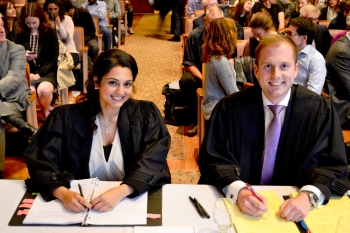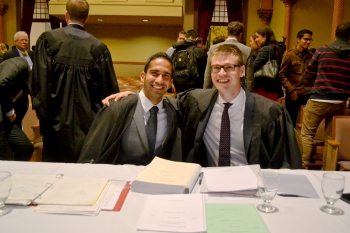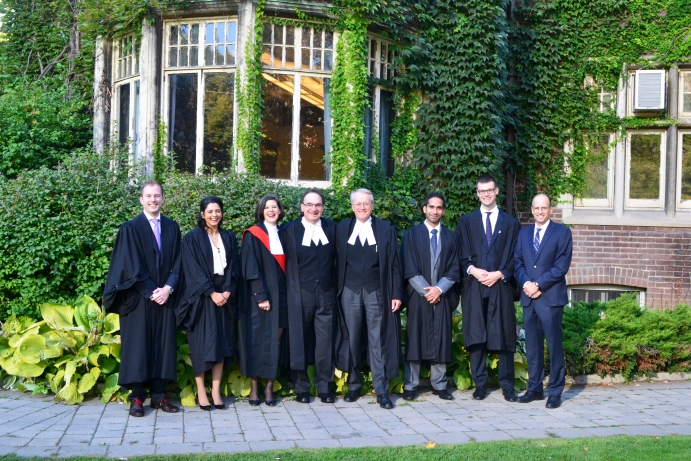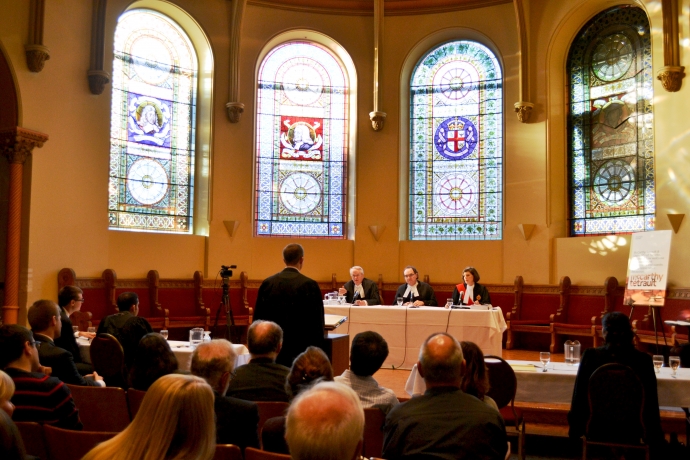By Alvin Yau, 1L / Photos by Rona Ghanbari, 2L
The evening of October 1 was a night to remember as the 2015 Grand Moot took place in Victoria College Chapel (the last one in our temporary home before the move to the Jackman Law Building next year) at the University of Toronto. Mooters Joe Bricker and Veenu Goswami presented their case for the appellant against Dave Marshall and Hana Dhanji in the prestigious annual event hosted by the Faculty of Law, and with generous support from long-time partner McCarthy Tétrault LLP.
 As usual, the Grand Moot attracted a very large audience ranging from faculty members, students, alumni and members of the general public, who not only filled the room to capacity but were also treated to superb oral advocacy and legal argumentation. Dean Edward Iacobucci shared opening remarks with the audience and thanked organizers and supporters of this year’s event.
As usual, the Grand Moot attracted a very large audience ranging from faculty members, students, alumni and members of the general public, who not only filled the room to capacity but were also treated to superb oral advocacy and legal argumentation. Dean Edward Iacobucci shared opening remarks with the audience and thanked organizers and supporters of this year’s event.
The evening’s theme was Freedom of Expression and The Right to be Forgotten which dealt with the timely question of what legal actions can be taken when potentially reputation damaging articles appear in search engine results. Specifically, the fact scenario challenged the mooters to consider whether a fictitious law which grants governmental power to impel a popularly consulted search engine to remove certain links deemed detrimental to an individual’s reputation is constitutionally valid in the country of Flavelle. The appellant team argued that the law was unconstitutional whereas the respondent team favoured the law’s current provisions and the power it grants to remove search certain engine results.
Alumni Justice Michael Moldaver, LLB 1971, of the Supreme Court of Canada and Justice Robert J. Sharpe, LLB 1970, of the Court of Appeal for Ontario, alongside Justice Julie Thorburn from the Ontario Superior Court of Justice served as judges for the 2015 Grand Moot. Together, this panel carefully examined the skillful arguments presented by both sides and inquired into the substance of the mooters’ submissions with probative questions and effective humour. The mooters’ responses, in turn, were well-prepared and witty.
As a final remark, Moldaver joked that in light of mooting theme seeking to clarify a “right to forget” law, he was looking for a “right to be remembered.”
 Appellant mooter Goswami started the event and submitted that search engines play a vital role in the “marketplace of ideas.” Thus, it needs protection from the contentious law which would otherwise force search engines to remove certain results from being listed, unconstitutionally limit free expression, and be a “detriment to the public interest.” Moreover, appellant co-counsel Bricker submitted that since the legislation gives a government commission the right to impel search engines to remove certain content regarding individuals, it is both unconstitutional and goes against what is most “beneficial to a free and democratic society”—that is, access to information. For the appellant team, this is an “overly broad law” that clearly needs revision.
Appellant mooter Goswami started the event and submitted that search engines play a vital role in the “marketplace of ideas.” Thus, it needs protection from the contentious law which would otherwise force search engines to remove certain results from being listed, unconstitutionally limit free expression, and be a “detriment to the public interest.” Moreover, appellant co-counsel Bricker submitted that since the legislation gives a government commission the right to impel search engines to remove certain content regarding individuals, it is both unconstitutional and goes against what is most “beneficial to a free and democratic society”—that is, access to information. For the appellant team, this is an “overly broad law” that clearly needs revision.
Conversely, the respondent’s team began when Marshall rebutted the appellant proposition by arguing that the law needs to catch up with the advances of the 21st century. For Marshall, “free speech is not unlimited and must be protected” and the government is the most capable agent to ensure that search engines and reputation damaging results will not “distort [public] perception in the marketplace of ideas” via the removal of harmful links. Similarly, co-counsel Dhanji submitted that unregulated search results may “damage [an individual’s] reputation” and does grievous harm for afflicted individuals leading to “social marginalization…in this brave new world.” The respondent team also noted the law’s positive effects on the public interest and its constitutionally validity.
Ultimately the court was impressed by the arguments and, in line with the Grand Moot custom, no formal decision was rendered. Nonetheless, Justice Thorburn noted how the justices were “very lucky to have seen this impressive performance” and the mooters’ preparedness for the “many off-the-cuff questions” from the judges. Justice Sharpe praised the mooters’ “mastery of the file” before saying that he “looked forward to seeing all four [of the mooters] in the courtroom.” Justice Moldaver concluded the judges’ remarks by praising the “brilliant” mooters and how they managed to succeed in doing the “hardest thing you can do” in legal advocacy.

As a final remark, Moldaver joked that in light of mooting theme seeking to clarify a “right to forget” law, he was looking for a “right to be remembered.” Certainly, the 2015 Grand Moot was one that will be remembered fondly for those who had the pleasure of personally witnessing this sharp demonstration of oral advocacy. Fortunately, for those who missed the event, a video of the event will be available shortly on the Faculty of Law website.


 As usual, the Grand Moot attracted a very large audience ranging from faculty members, students, alumni and members of the general public, who not only filled the room to capacity but were also treated to superb oral advocacy and legal argumentation. Dean Edward Iacobucci shared opening remarks with the audience and thanked organizers and supporters of this year’s event.
As usual, the Grand Moot attracted a very large audience ranging from faculty members, students, alumni and members of the general public, who not only filled the room to capacity but were also treated to superb oral advocacy and legal argumentation. Dean Edward Iacobucci shared opening remarks with the audience and thanked organizers and supporters of this year’s event. Appellant mooter Goswami started the event and submitted that search engines play a vital role in the “marketplace of ideas.” Thus, it needs protection from the contentious law which would otherwise force search engines to remove certain results from being listed, unconstitutionally limit free expression, and be a “detriment to the public interest.” Moreover, appellant co-counsel Bricker submitted that since the legislation gives a government commission the right to impel search engines to remove certain content regarding individuals, it is both unconstitutional and goes against what is most “beneficial to a free and democratic society”—that is, access to information. For the appellant team, this is an “overly broad law” that clearly needs revision.
Appellant mooter Goswami started the event and submitted that search engines play a vital role in the “marketplace of ideas.” Thus, it needs protection from the contentious law which would otherwise force search engines to remove certain results from being listed, unconstitutionally limit free expression, and be a “detriment to the public interest.” Moreover, appellant co-counsel Bricker submitted that since the legislation gives a government commission the right to impel search engines to remove certain content regarding individuals, it is both unconstitutional and goes against what is most “beneficial to a free and democratic society”—that is, access to information. For the appellant team, this is an “overly broad law” that clearly needs revision.